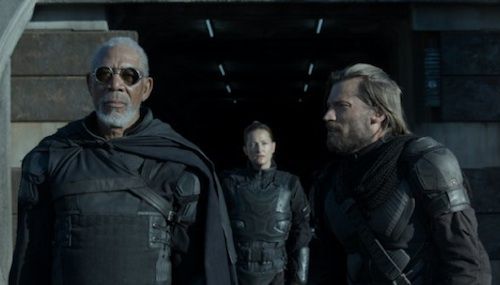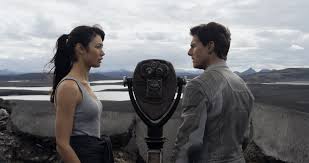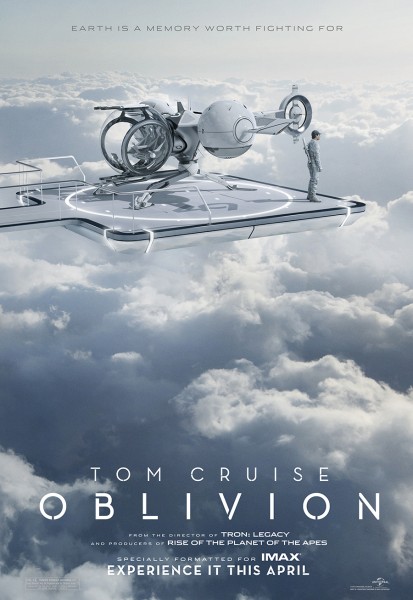 |
| Oblivion (2013) Jack Harper (Tom Cruise) stands on the landing pad to his home. |
This is a guest post written by Gabrielle Gopie-Tree.
I’m not a Tom Cruise fan and I usually don’t watch his films, but I quite like Oblivion. To be fair, I am partial to post-apocalyptic productions but often the action is overdone and the plot underdeveloped; this is certainly not the case with Oblivion, which is a film about monoculture. Monoculture lacks the essential elements for life: diversity, complexity, and struggle.
Ignatiy Vishnevetsky sees it differently. While he offers a humorous critique of patriarchy and a welcome, albeit limited, view of misogyny from his perspective as a White male of eastern origins, his superficial review of Oblivion ignores the soulful theme of the film: self-recovery. This idea is central to every aspect of the movie and is quite an unusual perspective in a Hollywood film, particularly in a genre that is typically focused on stereotypical masculinity. While discussion of sex-inequality in film is an encouraging development, there are serious flaws in this element of Vishnevetsky’s criticism. Here is my point of view from my perspective as a Black female of western origins.
Vishnevetsky starts with a spirited description of the colour (white) and shape of Jack’s ship, the docking station, and the interior of the central command’s arrival chamber as all being symbolic of female genitalia which he views as encapsulating a violent sexism. I disagree. Instead I see the distilled and contrived soul-lessness of these elements as juxtaposition against the reality of Jack’s former life; a life that keeps calling to Jack in the shape of his attachment to a very green getaway spot on Earth and romantic memories of a woman in pre-apocalyptic New York City. Jack projects an air of perpetual disorientation as his longing for a satisfying existence contrasts with his daily life.
Jack works with Vica (Andrea Riseborough) character to ensure the logistical resource extraction process on a devastated Earth in the year 2077. Vica and Jack are colleagues as well as lovers. They both represent a futuristic version of the patriarchal family: Jack goes out to work each day returning to prepared meals and perfunctory intimacy. Vica is the classic Stepford Wife in both appearance and behaviour: her sheer plasticity and vacuity are her essence. Jack is depicted as having a ‘ruggedly capable masculinity:’ he fixes, fights, and fucks. Despite the mental manipulation of his masters, Jack has a heart. We see this via his expressions of service to others: his successful fight to save a lone dog as well as the woman who turns out to be his wife, Julia (Olga Kurylenko), from death by drone, and his communication of loyalty to the human resistance who awaken him from his alien-induced programming. These are traits typically associated with the feminine, making this a rather feminist/womanist element of Jack’s character and the film itself.
 |
| Jack struggles with Drone 166 to get the machine to stand up. |
While Vishnevetsky compliments the storytelling method used in Oblivion, he simultaneously lambastes the film as being “derivative” of “several science-fiction movies at once.” I see this critique as plausible in light of the theme of the film itself – self-recovery. However, it seems that while Vishnevetsky is comfortable advancing some semblance of a gender critique, he is much less comfortable discussing the racial element of Oblivion, although he does mention the colour of the pseudo-feminine monoculture that amuses him so greatly as “white.” For example, who could miss the racial dynamics in the fact that there is (as far as I can tell) only one non-white man, Beech (Morgan Freeman), and one non-white woman, Julia–or, that Beech has a similar wake-up talk with Jack as did Morpheus (Laurence Fishbourne) with Neo (Keanu Reeves) in The Matrix. Vishnevetsky’s failure to talk race brings the sincerity of his limited discussion of gender into question.
 |
| Morgan Freeman as Beech, the resistance leader who helps Jack recover his identity. |
Furthermore, Vishnevetsky’s claim that: Oblivion is about a “lowly technician sending unmanned drones to hunt and kill a demonized, alien Other — until it forgets that it ever was” is overly simplistic. He ignores the element of struggle in the film which is necessary for life and Oblivion is most certainly about the life/death struggle; from the start of the film with Jack and Vica’s life-parody to the story’s culmination in Jack and Julia’s life-reality on a lush green patch of earth, complete with offspring.
 |
| Julia (Olga Kurylenko) and Jack recall a pre-apocalypse moment. |
While Vishnevetsky sees Oblivion as “a wannabe mindbender that raises questions about its lead character’s identity — except that the lead character is too sketchy to make these questions compelling,” I see it as an exploration of a man’s struggle to recover himself from monoculture programming which in itself requires interactions with others for one’s self-development to occur. Curiously, Vishnevetsky condemns Jack using the archetype of the self-sufficient masculinised rugged individual but mislabels it as “creation myth.” Thereafter, he bemoans what he sees as none of the many women in the film being “able to do anything without Harper’s help.” This is a very strange critique and smacks of a highly neoliberal notion of sameness as the benchmark for sex-equality. Also, it does not hold up in light of the fact that Vica administers both the home and the office each day while Jack fulfills his duties outside on the ground and she engages in almost all communications with Sally (Melissa Leo) at central control, including the authority to terminate her working relationship with Jack by simply saying they are no longer an “effective team.” Additionally, toward the end of the film Jack and Julia collaborate to challenge the authority of the alien masters including Julia’s decision to undergo cryosleep as the best option for facilitating Jack’s assault on the alien’s central command.
Do not be fooled by Vishnevetsky’s use of terms such as “uterus,” “vulva,” “mother figure,” “creation myth,” and “misogyny” which suggest a feminist critique of Oblivion that just is not there.
Gabrielle Gopie-Tree has a background in law, politics, psychology and spirituality. She is a nomadic social theorist trying to be the change she wants to see in the world; a believer in the lessons of the guide Qadhafi; and valiantly trying to allow the universe to unfold as it should.
